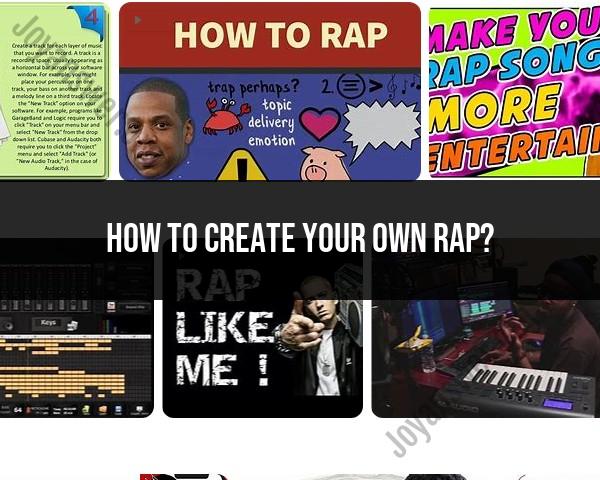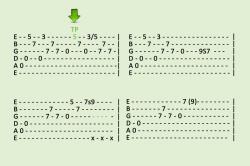How to create your own rap?
Creating your own rap as a beginner can be a rewarding creative process. Here's a step-by-step guide to help you get started:
Choose a Theme or Topic:Start by deciding what your rap will be about. It could be a personal experience, a story, an emotion, a social issue, or anything else that inspires you. Having a clear theme or topic will give your rap direction.
Listen to Rap Music:Familiarize yourself with rap music by listening to various artists and styles. Pay attention to the flow, rhyme schemes, and wordplay. This will help you understand the different techniques used in rap.
Write Your Lyrics:Begin writing your lyrics. Start with a hook, which is a catchy line or phrase that will grab the listener's attention. Then, work on your verses. Here are some tips for writing rap lyrics:
- Use wordplay: Experiment with rhyme, alliteration, assonance, and other poetic devices to make your lyrics more interesting.
- Be authentic: Write about your own experiences and emotions. Authenticity can resonate with listeners.
- Edit and revise: Don't be afraid to rewrite and refine your lyrics. Great rap often comes from multiple drafts.
Work on Rhyme Schemes:Rhyming is a fundamental aspect of rap. Experiment with different rhyme schemes, such as AABB, ABAB, or even more complex patterns. Rhymes don't always have to occur at the end of lines; internal rhymes can add depth to your lyrics.
Structure Your Rap:Organize your rap into verses and choruses. Verses are where you tell your story or deliver your message, and the chorus is the part that repeats and serves as a catchy, memorable hook.
Practice Flow and Delivery:Your flow is how you deliver your lyrics rhythmically. Practice your flow by rapping your lyrics over a beat. Pay attention to your timing, pronunciation, and emphasis on certain words. Work on your breath control, as good breath control is crucial for a smooth delivery.
Find a Beat:Find a suitable instrumental or beat that complements your rap. There are many websites and platforms where you can find free or paid beats to use for your rap.
Record Your Rap:Once you're comfortable with your lyrics, flow, and the beat, it's time to record your rap. You can use recording software and equipment, or you can even use smartphone apps for this purpose.
Edit and Mix:After recording, edit and mix your rap to achieve the desired sound quality. Adjust the levels, add effects, and ensure your vocals are clear and balanced with the beat.
Practice and Perform:The more you practice and perform your rap, the more confident and skilled you'll become. Consider performing for friends, at open mic events, or even recording videos to share on social media platforms.
Remember that creating rap is a creative process, and there are no strict rules. Be true to your own style and express yourself in your unique way. Over time, you'll continue to develop your skills and find your voice in the world of rap.
Sure, here's a comprehensive guide on creating, recording, and promoting your own rap music:
How to Create Your Own Rap: A Step-by-Step Guide
Creating a rap song involves a blend of creativity, technical skills, and personal expression. Here's a step-by-step guide to get you started:
Choose a Topic: Decide what you want to rap about. It could be a personal experience, a social issue, or simply a fun and catchy theme.
Brainstorm Ideas: Jot down words, phrases, and concepts related to your chosen topic. Let your mind wander and explore different angles.
Structure Your Lyrics: Organize your ideas into verses, choruses, and bridges. Consider rhyme schemes, rhythmic patterns, and storytelling elements.
Write Your Lyrics: Craft your lyrics, paying attention to wordplay, imagery, and the overall message you want to convey.
Practice and Refine: Recite your lyrics aloud, paying attention to flow, rhythm, and delivery. Make adjustments as needed to improve the overall sound and impact.
Writing Lyrics for Your Rap Song
Writing rap lyrics is an art form that combines storytelling, wordplay, and rhythmic expression. Here are some tips for writing effective rap lyrics:
Find Inspiration: Draw inspiration from your own experiences, observations, and emotions. Listen to other rap artists and analyze their lyrical techniques.
Use Vivid Language: Employ descriptive language, metaphors, and similes to paint vivid pictures in the listener's mind.
Explore Rhyme Schemes: Experiment with different rhyme schemes, such as AABB, ABAB, or internal rhymes, to create a sense of rhythm and flow.
Consider Rhythm and Flow: Pay attention to the rhythm and cadence of your lyrics. Read them aloud and adjust the phrasing to achieve a smooth and natural flow.
Convey a Message: Decide what you want your lyrics to say. Whether it's a personal story, a social commentary, or a lighthearted message, ensure your lyrics convey your intended meaning.
Finding Your Unique Style in Rap Music
Developing your unique style in rap music involves discovering your voice, experimenting with different techniques, and incorporating your personality into your music. Here are some tips:
Study Different Rap Styles: Listen to a variety of rap artists and subgenres to understand the range of styles and techniques.
Experiment with Flow and Delivery: Try different rhythmic patterns, vocal inflections, and emphasis to find a delivery style that suits you.
Incorporate Your Personality: Let your personality shine through your lyrics, delivery, and overall vibe. Be authentic and express yourself genuinely.
Collaborate with Others: Collaborate with other rappers, producers, and musicians to gain new perspectives and expand your creative horizons.
Practice and Evolve: Continuously practice, write new lyrics, and experiment with different styles to refine your unique voice in rap music.
Recording and Producing Your Rap Song
Recording and producing your rap song involves capturing your performance and enhancing it with production techniques. Here's a basic approach:
Choose Recording Equipment: Depending on your budget and setup, you can use a professional studio, a home studio setup, or even a smartphone with a decent microphone.
Record Your Vocals: Practice your delivery and record multiple takes to capture the best performance.
Find a Beat or Instrumental: You can create your own beat using music production software or find royalty-free beats online.
Mix and Edit: Combine your vocals with the beat, adjust volume levels, and apply basic mixing techniques to create a cohesive sound.
Mastering: If possible, have your song professionally mastered to enhance its overall sonic quality and balance.
Sharing and Promoting Your Rap Music
Once you've created your rap song, it's time to share it with the world. Here are some ways to promote your music:
Online Platforms: Upload your song to streaming platforms like Spotify, SoundCloud, or YouTube. Create an artist profile and engage with listeners.
Social Media: Use social media platforms like Instagram, TikTok, or Twitter to share snippets of your music, connect with fans, and promote upcoming releases.
Live Performances: Perform at local venues, open mic nights, or online events to showcase your talent and gain exposure.
Networking: Connect with other artists, producers, and industry professionals to build relationships and expand your network.
Consistency and Engagement: Be consistent in releasing new music, engaging with fans, and promoting your work. Building a fanbase takes time and dedication.












